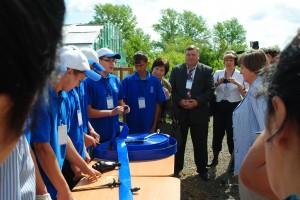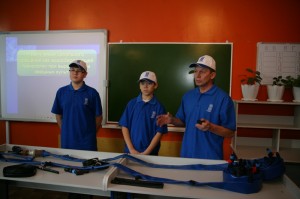 ASTANA – The secondary school in Vyacheslavka Village in the Arshaly District in the Akmola Region supports Kazakhstan’s efforts for a green economy and has mobilised resources to demonstrate water sanitation and hygiene (WASH) practices in schools using renewable energy sources.
ASTANA – The secondary school in Vyacheslavka Village in the Arshaly District in the Akmola Region supports Kazakhstan’s efforts for a green economy and has mobilised resources to demonstrate water sanitation and hygiene (WASH) practices in schools using renewable energy sources.
The school’s 120 students and 25 teachers have been working with the Akbota NGO since 2011 to advance green technologies to address social issues in rural schools and rural communities.
Akbota works with the Every Drop Matters (EDM) Global Programme, the United Nations Development Programme (UNDP), the Coca-Cola Company, the GEF Small Grants (GEF-SGP) Programme and UNDP in Kazakhstan to implement green technologies throughout Kazakhstan.
“While working in rural schools, I have faced several challenges to be addressed, especially WASH practices in rural communities, schools and clinics,” said Vycheslavka Secondary School Director Tatyana Nemtsan.
These WASH issues are linked with the problems of energy sources: treating, pumping and heating the water. Rural communities use poor quality water and in some areas water sources are chemically contaminated.
Initial test samples of water quality in the Arshaly District show that water is contaminated with heavy metals, chlorides and sulphates. Threats to water quality are becoming a high risk to human health: 90 percent of the region’s adult population suffer multiple diseases caused by poor quality drinking water.
The heating systems at rural schools, clinics and houses also work insufficiently. During winter, inside temperatures can drop to +8C, when outside temperatures reach -40C. In addition, poor heating systems influence the availability of hot water for sanitary and hygiene purposes at rural schools and clinics.
To address these issues, green technology advocates at Vycheslavka Secondary School and Akbota decided to demonstrate a comprehensive approach for WASH practices.
Four community-based advanced technologies have been implemented in the region: water filters – treating and supplying clean drinking water; flat-plate solar collectors – renewable energy sources to supply warm water for public buildings; pyrolysis boiler – energy efficient and environmentally friendly heating systems for public buildings; greenhouse and low-cost drip irrigation – energy efficient community-level small greenhouses to increase food security in the northern part of the country.
These green technologies improve WASH practices. Using renewable energy sources, the initiative provided eight pilot territories, including six rural schools and two medical clinics, with clear drinking water, heating systems for buildings and water supply systems and energy efficient greenhouses with low-cost drip irrigation.
The project installed water filters to provide better quality drinking water, decrease diseases and ensure that water standards comply with basic hygiene practices for rural people in the Akmola region. Energy-free flat-plate solar collectors were installed to supply hot water in school cafeterias and clinic rooms. Today, these facilities have regular access to +40C warm water, even when the temperature outside is -30C.
Energy efficient pyrolysis boilers were also installed in rural schools, clinics and houses to heat buildings efficiently. This domestically manufactured heating system has the capacity to reduce coal consumption by 25 percent and electricity use by 30 percent.
Another part of the project is energy-efficient greenhouses with low-cost drip irrigation systems. They have allowed schools to produce vegetables, such as tomatoes, cucumbers and cabbage early in the spring when temperatures are still low in the northern part of the country and to provide local schools with fresh vegetables. The greenhouses have also reduced water use up to 40 percent and have saved nearly 134,000 cubic metres of water.
The project has also mobilised rural communities, schools and public organisations to reconstruct water supply and heating systems to improve health, sanitation and hygiene practices. More than 30,000 people, including 5,300 school children, are involved in the greening of their districts.
Green initiatives have been supported by rural communities because they introduce best practices with simple methods and create a sense of ownership within communities. In addition, Akbota has mobilised more than 100 young volunteers to promote new practices in other rural communities.
Today, local communities, including teachers and school children, clinic personnel, farmers, agricultural producers, as well as local authorities from regions, are a part of the green movement. With the support of the UNDP project, an opportunity also appeared to present ideas to other regions of Kazakhstan, including in East Kazakhstan, Kyzylorda and Kostanay.
The success of the green approach gained attention from the central government. Members of the Kazakh Parliament and akims (governors) of the Kostanay and Akmola regions visited the pilot territories and acknowledged the effectiveness of the projects. After high-level visits, officials recommended scaling up green initiatives in 24 more rural communities countrywide. The Integrated Green Technologies action plan is now being developed to make it happen.
A small project started by a school in Vyacheslavka has evolved into a countrywide greening initiative benefiting people and the environment.
